|
|
|
Sort Order |
|
|
|
Items / Page
|
|
|
|
|
|
|
| Srl | Item |
| 1 |
ID:
106058
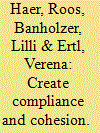

|
|
|
|
|
| Publication |
2011.
|
| Summary/Abstract |
Established conflict theories focus on the role of incentives in the decision to join, stay, or leave an insurgency. These theories, however, disregard the pressure that an organization can impose on its members. Similar to legal organizations, we assert that a rebel organization can sustain itself by effective human resource management. Using narratives resulting from psychological trauma therapy of former combatants of the Lord's Resistance Army (LRA), these management strategies are examined. The analysis shows that the LRA sustains itself in the first place by the use of brute force. However, they also manage themselves by a careful selection process of their fighters, by the conscious creation of social control, and by offering their members an alternative social network in which promotion and compensation play a role.
|
|
|
|
|
|
|
|
|
|
|
|
|
|
|
|
| 2 |
ID:
096565
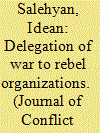

|
|
|
|
|
| Publication |
2010.
|
| Summary/Abstract |
States in an international dispute sometimes choose to attack their enemies with their own military forces but other times choose to empower domestic insurgent groups. What explains the decision to act through rebel proxies rather than directly engage a rival? Theories and empirical analyses of international conflict have adopted a state-centric bias, ignoring the substitution between direct uses of force and indirect action through rebel organizations. This note examines the decision to delegate conflict to rebels through the lens of principal-agent theory. While states support rebel groups to forgo some of the costs of conflict, they also lose a degree of foreign policy autonomy. Preliminary evidence of conflict delegation is presented, along with a number of empirically testable propositions. Finally, the consequences of delegation from the rebels' perspective are explored. This framework serves as a starting point for future research on rebel-patron interactions.
|
|
|
|
|
|
|
|
|
|
|
|
|
|
|
|
| 3 |
ID:
163274
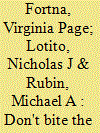

|
|
|
|
|
| Summary/Abstract |
Why do some rebel groups resort to terrorism tactics while others refrain from doing so? How rebel organizations finance their rebellion creates variation in the extent to which terrorism undermines their legitimacy. Rebel organizations pay attention to the legitimacy costs associated with terrorism. Organizations that rely primarily on civilian support, and to a lesser extent on foreign support, exercise more restraint in their use of terrorism. Rebels who finance their fight with lootable resources such as gems or drugs are least vulnerable to the costs of alienating domestic supporters. Thus, they are more likely to resort to terrorism and to employ more of it. The article elaborates this legitimacy-cost theory and tests it using new data on Terrorism in Armed Conflict from 1970 to 2007. We find robust support for the hypothesis that groups who finance their fight with natural resources are significantly more likely to employ terrorism (though not necessarily to conduct more deadly attacks) relative to those who rely on local civilian support. Groups with external sources of financing, such as foreign state support, may be more likely to engage in terrorism than those who rely on local civilians, but not significantly so.
|
|
|
|
|
|
|
|
|
|
|
|
|
|
|
|
| 4 |
ID:
107533
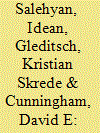

|
|
|
|
|
| Publication |
2011.
|
| Summary/Abstract |
Many rebel organizations receive significant assistance from external governments, yet the reasons why some rebels attract foreign support while others do not is poorly understood. We analyze factors determining external support for insurgent groups from a principal-agent perspective. We focus on both the supply side, that is, when states are willing to support insurgent groups in other states, and the demand side, that is, when groups are willing to accept such support, with the conditions that this may entail. We test our hypotheses using new disaggregated data on insurgent groups and foreign support. Our results indicate that external rebel support is influenced by characteristics of the rebel group as well as linkages between rebel groups and actors in other countries. More specifically, we find that external support is more likely for moderately strong groups where support is more likely to be offered and accepted, in the presence of transnational constituencies, international rivalries, and when the government receives foreign support.
|
|
|
|
|
|
|
|
|
|
|
|
|
|
|
|
| 5 |
ID:
133276
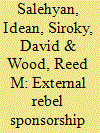

|
|
|
|
|
| Publication |
2014.
|
| Summary/Abstract |
Although some rebel groups work hard to foster collaborative ties with civilians, others engage in egregious abuses and war crimes. We argue that foreign state funding for rebel organizations greatly reduces incentives to "win the hearts and minds" of civilians because it diminishes the need to collect resources from the population. However, unlike other lucrative resources, foreign funding of rebel groups must be understood in principal-agent terms. Some external principals-namely, democracies and states with strong human rights lobbies-are more concerned with atrocities in the conflict zone than others. Multiple state principals also lead to abuse because no single state can effectively restrain the organization. We test these conjectures with new data on foreign support for rebel groups and data on one-sided violence against civilians. Most notably, we find strong evidence that principal characteristics help influence agent actions.
|
|
|
|
|
|
|
|
|
|
|
|
|
|
|
|
| 6 |
ID:
180658
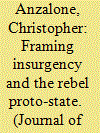

|
|
|
|
|
| Summary/Abstract |
This article traces the foundations, development, and evolution of Al-Shabaab’s multi-tiered media and information operations through a historical lens from proto and early Al-Shabaab media in 2006 and early 2007 up to the beginning of 2021. Arguing that the group’s media campaign is an integral part of its broader proto-state governance operations and kinetic actions, the article pays particular attention to central narrative frames aimed at domestic Somali, regional East African, and international audiences – both friendly and non-friendly – as well as to the role of media and information operations as part of the group’s domestic governance operations.
|
|
|
|
|
|
|
|
|
|
|
|
|
|
|
|
| 7 |
ID:
190845
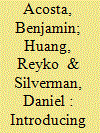

|
|
|
|
|
| Summary/Abstract |
Existing literature on civil wars relies predominantly on state- and organization-level variables to understand conflict dynamics and outcomes. In this article, we propose that rebel leaders’ personal backgrounds and experiences are also key to explaining the behavior of the organizations they lead. Just as scholars have long highlighted the importance of state leaders’ biographical characteristics in interstate war and diplomacy, we argue that the attributes of rebel leaders affect their organizations’ decisions and actions in civil war. To substantiate our claims, we introduce the Rebel Organization Leaders (ROLE) database, which contains a wide range of biographical information on all top rebel leaders in civil wars ongoing between 1980 and 2011. We first describe the contents of the database and present a number of novel descriptive findings about rebel leaders. To illustrate its utility, we then examine the influence of rebel leaders’ attributes on their organizations’ use of terrorism in civil war. Ultimately, our work encourages – and enables – a new research agenda that goes beyond rebel organizations and campaigns as units of analysis and brings individual leaders more fully into modern conflict and peace studies.
|
|
|
|
|
|
|
|
|
|
|
|
|
|
|
|
| 8 |
ID:
179160
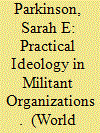

|
|
|
|
|
| Summary/Abstract |
Ideology shapes militant recruitment, organization, and conflict behavior. Existing research assumes doctrinal consistency, top-down socialization of adherents, and clear links between formal ideology and political action. But it has long been recognized that ideological commitments do not flow unaltered from overarching cleavages or elite narratives; they are uneven, contingent, fraught with tension, and often ambivalent. What work does ideology do in militant groups if it is not deeply studied, internalized, or sincerely believed? How can scholars explain collective commitment, affinity, and behavioral outcomes among militants who clearly associate themselves with a group, but who may not consistently (or ever) be true believers or committed ideologues? I argue that practical ideologies—sets of quotidian principles, ideas, and social heuristics that reflect relational worldviews rather than specific published political doctrines, positions, platforms, or plans—play a key role in militant socialization through everyday practices. Ethnographic evidence gained from fieldwork among Palestinians in Lebanon demonstrates how militants and affiliates render ideas about ideological closeness and distance accessible through emotional, intellectual, and moral appeals. This approach reaffirms the role of discourse and narrative in creating informal mechanisms of militant socialization without expressly invoking formal doctrine.
|
|
|
|
|
|
|
|
|
|
|
|
|
|
|
|
| 9 |
ID:
109233
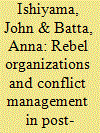

|
|
|
|
|
| Publication |
2011.
|
| Summary/Abstract |
How do the organizational features of rebel groups participating in civil wars affect the likelihood of the resumption of conflict after a civil war has ended? As many scholars have noted, peace duration is a function of the extent to which rebel groups stick to the deal. However, occasionally a rebel group fractures, and the conflict resumes as a result. Using a combination of existing data on civil conflicts and characteristics of the settlement agreement, along with original data on the characteristics of the insurgent organizations implementing the agreement, we test the effect of the organizational features of the rebel group on the duration of the peace settlements that occurred after the end of the cold war until 2009.
|
|
|
|
|
|
|
|
|
|
|
|
|
|
|
|
| 10 |
ID:
182541
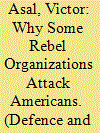

|
|
|
|
|
| Summary/Abstract |
Hating America – and attacking Americans – can seem like a mandatory activity for rebels; yet, only a minority of rebel groups actually harm Americans. Under what circumstances do rebel groups target Americans? To answer these questions, we leverage the Big Allied And Dangerous 2 data – Insurgency subsample (BAAD2-I). Our model focuses on two classes of rebel motives: direct and indirect. Direct motives are those in which Americans play a central role in rebel group grievances. They include ideology, deployment of American troops, and American support for rebels’ government-based opponents. Indirect motives are those that encourage anti-American attacks because of their powerful symbolic value. This distinction speaks to ongoing policy debates within the United States about the most effective policy instruments to defeat extremism abroad. Contrary to common perceptions, we find that attacks on Americans are unrelated to group ideology. Instead, deployment of American troops and military assistance is positively associated with attacks on Americans, as is economic penetration. Conversely, rebel groups in countries with substantial exports to the US or featuring a long-term presence of American cultural artifacts are less likely to attack Americans. Our findings highlight the value of a ‘soft power’ orientation in American foreign policy.
|
|
|
|
|
|
|
|
|
|
|
|
|
|
|
|
|
|
|
|
|